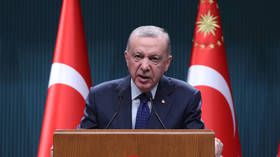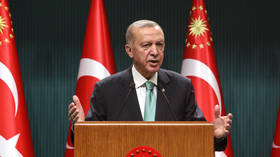Syrian Christians are not necessarily better off with the new government in Damascus
Syria: Muslims threaten to seize Christian lands,
tell some Christians to leave their homes or be killed
This is how all the lands that are today considered part of the “Islamic world” became Muslim. It was not done by “wisdom and beautiful preaching” (Qur’an 29:46), but by force, threats and intimidation. See The History of Jihad for the full story.
After an ‘isolated’ incident… Christian existential anxiety in Maaloula, Syria
translated from “بعد حادثة «فرديّة»… قلق مسيحيّ وجوديّ في معلولا السوريّة” ACI MENA, December 29, 2024:
Since the change in the ruling class in Syria, the Christians of Maaloula have been experiencing existential anxiety that has worsened after an incident that occurred between two Christian and Muslim families. So what is the story? And what is the reality of Christians today in this ancient Christian town?
A church source who preferred to remain anonymous told “ACI MENA” that the regime of former President Bashar al-Assad, after regaining control of Maaloula about 10 years ago, prevented some of the town’s Muslims from returning to it because of their cooperation with the Al-Nusra Front in the killing, kidnapping, and vandalism of Christians and their churches. However, after the fall of the regime, these people returned and entered the town, and some of them exerted pressure on the Christians under the pretext that the Christians had worked to displace them.
The source explained: “Some of the deportees caused problems, and Christians were considered part of the previous regime, knowing that their joy at its fall exceeded that of others; most of our youth emigrated due to compulsory conscription or reserve service requests.”
Regarding the attacks on Christians, the source said: “Threats began against five Christian families to seize their agricultural lands, and some Christians were asked to leave their homes and the town or they would be killed. The reason for these threats was either an old vendetta or some Christians were accused of carrying weapons and joining the ‘National Defense.’”
The source added: “The threats turned into action when Bashar Shahin’s house and his family’s house and the cafeteria he owned were seized, despite some Muslims defending them. After mediation, he was allowed to take his belongings from the house. Two houses were also broken into and robbed. There are also other types of harassment and provocations, such as shooting near a priest while he was distributing Christmas gifts to children in a kindergarten, in addition to Christians informing a priest that they had been spat upon.
The source confirmed that the one in charge in Maaloula is a person who belongs to the Turkish Suleiman Shah faction (the name of the grandfather of Osman I, the founder of the Ottoman Empire). Therefore, there were appeals from the people of Maaloula and its church officials for the intervention of Hay’at Tahrir al-Sham.
He explained: “The Christians of Maaloula do not feel reassured; with the absence of the state, upon whose presence we relied, security has disappeared, especially since weapons have been completely withdrawn from the Christians and left in the hands of others. We are advocates of peace and we want to build Maaloula hand in hand with all its residents.”
He continued: “The major incident occurred at dawn on December 26, when Abdul Salam Diab and his father stormed Ghassan Zakhem’s farm with the aim of stealing it, which resulted in the death of Abdul Salam. But unfortunately, it was portrayed as a religious issue and that Christians wanted to attack and kill Muslims, knowing that it was a purely individual issue.”
The source concluded by pointing out that this incident was the spark for many Christian families to leave the town out of fear, due to the lack of a force to protect them and ensure their safety. Out of about 325 Christian families, about 80 families left. The incident also led to the seizure of four Christian homes belonging to relatives of Zakham.
Regarding the details of the December 26 incident, an informed source from the Christian residents of Maaloula told ACI Mina: “Before Christmas, young men from Hay’at Tahrir al-Sham insisted on Christians decorating their homes to avoid any problems, but things did not go normally.”
He continued: “At dawn on December 26, the surveillance cameras at Ghassan Zakhem’s farm indicated the presence of masked men who broke the lock on the farm’s door. Ghassan and his son Sarkis headed to the location immediately and asked the members of the security committees to accompany them, but they did not come despite their promise to come.”
The source confirmed that after the farm owners arrived at the location, an exchange of fire took place between the two parties, resulting in the death of the person who attacked the land (Abdul Salam). Ghassan turned himself in to Father Fadi Al-Barkil, who in turn handed him over to the competent authorities in Damascus to prevent any disastrous strife.
Dale Carnegie could write a new chapter in his classic, self-improvement book over this.
Anneke de Laaf
I had wondered about that and am not surprised they refused to shake her hand, it is the hate-beard’s way. Then again, why you would want to visit the headchoppers let alone shake their hand, is beyond me. At the Damascus airport, representatives of the welcoming party did not shake the minister's hand - a woman. Later, the leader of the armed groups that came to power in Damascus, Ahmed al-Sharaa, did exactly the same."As soon as I arrived, it was clear to me that there would obviously be no ordinary handshakes," Baerbock told reporters. She claimed that during the visit she made it clear to her hosts that the guests frowned upon the practice and that respect for women's rights was a measure of how free a society was.Former head of the Berlin Foundation for Science and Politics Volker Perthes called the refusal to shake hands with a female minister a bad sign. "This is not a tradition in Syria," he told the Stern magazine. "This is not good, even if we know about it from other countries where men who represent extremely conservative Islam are in power, such as in Iran or until recently in Saudi Arabia," the political scientist believes.Baerbock and Barrot became the first European foreign ministers to visit Syria since Bashar al-Assad stepped down as president.
Türkiye will intervene at ‘slightest risk’
of Syria splintering – Erdogan

Turkish President Recep Tayyip Erdogan has warned that his country will intervene if necessary to avoid any division of Syria and will be “uncompromising” in its determination.
The comments from Erdogan are seen as a veiled warning to the Kurdish-dominated Syrian Democratic Forces (SDF), as well as to the US, which backs the group against Islamic State forces.
“We cannot accept under any pretext that Syria be divided and if we notice the slightest risk we will take the necessary measures,” the Turkish leader said in remarks following the first cabinet meeting of 2025.
He added that Ankara has “more than enough power, capacity, and talent to do this.”
Erdogan said Türkiye could “come suddenly one night” without warning to prevent a splintering of its neighbor. He insisted that there is “no place for terrorism in the future of the region” and that those who choose terror will be “buried with their weapons.”
Erdogan has repeatedly said that the Kurdish group poses a threat to Türkiye’s security and promised to prevent a “terror corridor” from opening up on its southern borders. Last month, he vowed to “bury” the Kurdish militants and called on NATO and the US to choose between supporting Türkiye or the Kurdish People’s Protection Units (YPG), which is operating near the Turkish and Iraqi borders, along with other Kurdish groups.
Ankara views the YPG as an extension of the Kurdistan Workers’ Party (PKK) and regards both as terrorist organizations.
The SDF, dominated by the YPG, has called for a nationwide ceasefire in Syria following the fall of Syrian President Bashar Assad’s government in early December to Hayat Tahrir-al-Sham (HTS) jihadists. It has also called on the US to help protect Syrian territory from Turkish attacks and for an end to what it regards as Ankara’s occupation of the country’s northern regions.
However, around 100 people died in clashes between YPG forces and pro-Türkiye factions over the weekend, according to AFP.
Türkiye, meanwhile, has attempted to foster ties with the new Syrian leadership, with Foreign Minister Hakan Fidan visiting Damascus last month and calling for the lifting of economically-crippling international sanctions on the country.






No comments:
Post a Comment